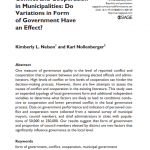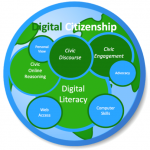Conflict and Cooperation in Municipalities: Do Variations in Form of Government Have an Effect?

Conflict and Cooperation in Municipalities: Do Variations in Form of Government Have an Effect?
One measure of governance quality is the level of reported conflict and cooperation that is present between and among elected officials and administrators. High levels of conflict or low levels of cooperation can hinder the decision-making process. However, there are few attempts to assess the causes of conflict and cooperation in the existing literature. This study uses an expanded typology of local government form and additional independent variables to determine what factors are likely to lead to conditions conducive to cooperation and lower perceived conflict in the local governance process. Data on government performance and indicators of perceived conflict and cooperation were collected from a national survey of municipal mayors, council members, and chief administrators in cities with populations of 50,000 to 250,000. Our results suggest that form of government and proportion of council members elected by district are two factors that significantly influence governance at the local level.
Cite as:
Nelson, K. L., & Nollenberger, K. (2011). Conflict and Cooperation in Municipalities: Do Variations in Form of Government Have an Effect? Urban Affairs Review, 47(5), 696–720. https://doi.org/10.1177/1078087411409129
…


